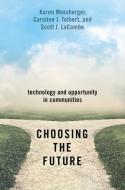From the Oxford University Press website:
Digital information drives participation in politics, the economy, and society. Yet great disparities exist as to which communities have access to the internet. In 2017, only half of residents of formerly industrial Flint, Michigan, had broadband or satellite internet at home, while over 90 percent of those in thriving Sunnyvale, California, in Silicon Valley, were connected. More recently, Covid-19 laid bare these persistent digital divides in both urban and rural communities, illustrating that broadband use is a fundamental resource for the future of opportunity in communities.
While previous studies have examined the impacts of broadband infrastructure, they have indicated little about the extent to which local populations can afford and use the technology. Moreover, there has been limited scientific evidence on how broadband adoption matters for collective benefits. Including new data on broadband subscriptions from 2000-2017, and comprehensive analysis for U.S. states, counties, metros, cities, and neighborhoods, Choosing the Future argues that broadband use in the population is a form of digital human capital that benefits communities as well as individuals.
Broadband has a causal impact across all types of communities--for economic prosperity, growth, income, employment, and policy innovation. Yet there are urban neighborhoods and rural counties where as little as one-quarter of the population has a broadband subscription, even when mobile is included. As we build "smart" cities and communities, as economies and jobs continue to experience rapid change, and as more information and services migrate online, it is communities with widespread broadband use that will be best positioned for inclusive innovation, with the digital human capital to thrive.
About Caroline J. Tolbert
Professor of Political Science Caroline Tolbert, the Lowell G. Battershell University Distinguished Chair at the University of Iowa, is the author/coauthor of eight books, as well as dozens of articles in scholarly journals. Her research explores voting, elections, public opinion, and representation widely defined. She has contributed to many subfields, including digital politics and information technology policy, voting and elections, public opinion, American state politics, direct democracy and race and politics. She joined the Department of Political Science faculty in 2006, and is affiliated with the UI Public Policy Center. Her books include:
- Choosing the Future: Technology and Opportunity in Communities (2021)
- Why Iowa? How the Caucuses and Sequential Elections Improve the Presidential Nomination Process (2011)
- Educated by Initiative: The Effects of Direct Democracy on Citizens and Political Organizations in the American States (2004)
- Democracy in the States: Experiments in Election Reform (2003)
- Citizens as Legislators: Direct Democracy in the United States (1998)
- Digital Cities: The Internet and the Geography of Opportunity (2012)
- Digital Citizenship (2008)
- Virtual Inequality: Beyond the Digital Divide (2003)
- We the People with Lowi, Ginsberg and Wier (2013, W.W. Norton)
